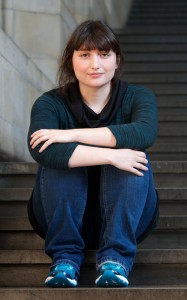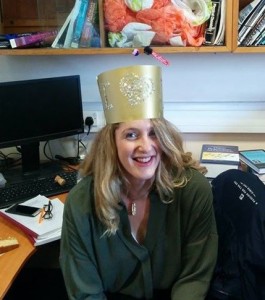 Rebecca Ingle is a second year PhD student in the Bristol Laser Group in the School of Chemistry. Her research involves studying photodissociation dynamics in both the gas and solution phase using a combination of laser experiments and computational chemistry methods.
Rebecca Ingle is a second year PhD student in the Bristol Laser Group in the School of Chemistry. Her research involves studying photodissociation dynamics in both the gas and solution phase using a combination of laser experiments and computational chemistry methods.
Avid followers of Chemistry’s ‘Friday Good News’ might know that it has been a rather busy week for the Bristol Laser Group, with three PhD vivas in two days. Apparently, the book of Guinness World Records doesn’t have an entry for ‘most PhD vivas completed in a week,’ but I suspect we’d be in the running for the record.
Vivas mark the end of the huge amount of work involved in a PhD and are strange times for everyone involved. For the candidates, there is the whole gamut of emotions, from the terrifying pre-viva wait to the exhausted relief when it is all over. For the older PhD students, it is an uncomfortable reminder of data that has yet to be collected and experiments that are yet to work. As well as being a celebratory time, it is often a sad goodbye to colleagues.

Sometimes academia can feel a bit like a revolving door of new colleagues and contacts. New students roll through the doors in September, the Master’s students disappear in May and throughout the year, both PhDs and postdocs move onto pastures new. Both friends and collaborators tend to live at the opposite end of the country (if you’re lucky) or even on different continents.

As part of a PhD, you will end up meeting an overwhelming number of people and it quickly becomes impractical to keep in contact with most of them. I’ve met so many people over the last 18 months that I’m surprised I can remember half their names. To avoid this, a lot of networking courses recommend keeping a ‘Stalker Book’ (not the phrase they use). You use this to keep note of everyone you meet on the conference circuit, as well as various details about them. To me, this sounds rather creepy but the idea of this circumvents the embarrassing situation where you meet someone who knows you and your research well but you have no idea who they are, which has thankfully only happened to me once.
Email is a wonderful thing for keeping in touch in the modern era of mobility and conferences will become a great time for catching up with others in your field. Generally I find most people in academia understand that a quarterly email and biennial visit is the foundation of a solid friendship. Don’t be surprised, though, if any social correspondence continually ends up being prefaced with ‘I’m sorry for the late reply but…’ though do be warned, these tactics may not work so well on family members.
Congratulations to our three new doctors!

